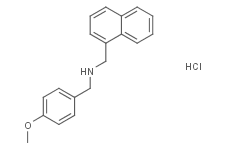
ML133 HCl
CAS No. 1222781-70-5
ML133 HCl( —— )
Catalog No. M17888 CAS No. 1222781-70-5
ML133 HCl is a selective potassium channel inhibitor for Kir2.1 with IC50 of 1.8 μM (pH 7.4) and 290 nM (pH 8.5), has no effect on Kir1.1 and weak activity for Kir4.1 and Kir7.1.
Purity : >98% (HPLC)
 COA
COA
 Datasheet
Datasheet
 HNMR
HNMR
 HPLC
HPLC
 MSDS
MSDS
 Handing Instructions
Handing Instructions
| Size | Price / USD | Stock | Quantity |
| 5MG | 39 | Get Quote |


|
| 10MG | 55 | Get Quote |


|
| 25MG | 97 | Get Quote |


|
| 50MG | 156 | Get Quote |


|
| 100MG | 259 | Get Quote |


|
| 200MG | 336 | Get Quote |


|
| 500MG | 566 | Get Quote |


|
| 1G | Get Quote | Get Quote |


|
Biological Information
-
Product NameML133 HCl
-
NoteResearch use only, not for human use.
-
Brief DescriptionML133 HCl is a selective potassium channel inhibitor for Kir2.1 with IC50 of 1.8 μM (pH 7.4) and 290 nM (pH 8.5), has no effect on Kir1.1 and weak activity for Kir4.1 and Kir7.1.
-
DescriptionML133 HCl is a selective potassium channel inhibitor for Kir2.1 with IC50 of 1.8 μM (pH 7.4) and 290 nM (pH 8.5), has no effect on Kir1.1 and weak activity for Kir4.1 and Kir7.1.
-
In Vitro——
-
In Vivo——
-
Synonyms——
-
PathwayAngiogenesis
-
TargetCDK
-
RecptorKir2.1
-
Research AreaOthers-Field
-
Indication——
Chemical Information
-
CAS Number1222781-70-5
-
Formula Weight313.82
-
Molecular FormulaC19H19NO·HCl
-
Purity>98% (HPLC)
-
SolubilityDMSO : ≥ 125 mg/mL; 398.32 mM
-
SMILESCl.COC1=CC=C(CNCC2=CC=CC3=C2C=CC=C3)C=C1
-
Chemical Name——
Shipping & Storage Information
-
Storage(-20℃)
-
ShippingWith Ice Pack
-
Stability≥ 2 years
Reference
1. Wang HR, et al. ACS Chem Biol, 2011, 6(8), 845-856.
molnova catalog



related products
-
KB-0742 dihydrochlor...
KB-0742 dihydrochloride is a potent, selective and orally inhibitor of ?CDK9.
-
Rosavin
Rosavin has antidepressant and anxiolytic actions, helps balance all the neurotransmitters.
-
Senexin-A
A selective inhibitor of CDK8 (IC50=0.28 uM) and CDK19; inhibits CDK8 and CDK19 ATP site binding with Kd50 of 0.83 uM and 0.31 uM, respectively.



 Cart
Cart
 sales@molnova.com
sales@molnova.com


